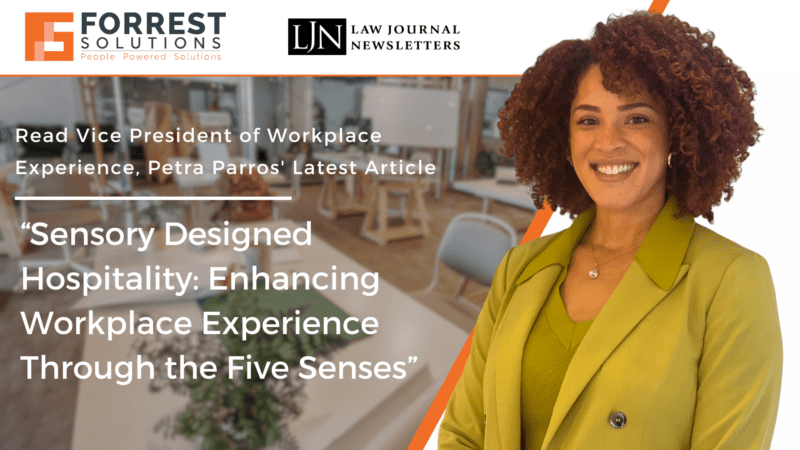
Law Firms Embracing ‘Hoteling’ to Save On Office Lease Costs
By Anthony Davies
This article originally appeared in Law.com here. Listen to a summary below.
The Need to Optimize Real Estate
Law firms are utilizing less than half of their real estate. Kastle Systems reports that as of March 2023, the overall office occupancy rate is 48%, with the occupancy rate for law firms varying around that, ranging between 26% to 50% of their space for most firms.[1] With the average law firm spending 10.5% of gross annual revenue on real estate[2], this overhead expense is significant—and not utilizing half or more of it is of enormous concern.
Here’s a quick, reductive calculation—given the average full-service Class A asking rent across 21 markets is $40.17[3] per square foot[4] and that law firms occupy approximately 120 million square feet of real estate in total, we’re talking about a very large number: $24trillion dollars in unused real estate per year. It really should come as no surprise that 65% of law firms are expected to reduce their space needs, both when renewing in place or relocating.[5]
Over the past year and a half, law firms have, in fact, started to implement space reduction strategies, reducing space per attorney ratios and overall square footage by 13% on average. The declines in space-per-attorney have been even larger in high-cost gate way markets and for the largest firms.[6] Additionally, it is anticipated that nearly 75% of law firms will design space that can be more easily divided, providing greater flexibility.[7]
A half-empty office is not only anathema to the bottom-line, but they also do not help promote culture and collaboration which is a major purpose of the in office experience. A recent study by Microsoft, in fact, showed quite clearly that the peer-seeking behaviors of professionals was the number one reason anyone wanted to go back to the office at all.[8]
Which brings us to the hot-button question of hoteling. Pre-pandemic law firms were likely to look around for precedent on how to structure their office space, but since 2020, everyone has been trying to figure out what works best for their firm. Workplace strategies in many law firms have been shifting; flexibility, balance, space efficiency, and attorneys/staff that work remotely more than pre-pandemic are gaining relative normalcy—and by the most recent study Q3 2023, over half of the seats available in law firms are now designated as reservable for hoteling.[9]
While new to law firms, hoteling strategies are line with the practices of companies in other verticals where hoteling and 100% work flexibility have been successfully in place for some time. In professional services, including PwC, Deloitte, KPMG and others, “clean desk” policies have long supplanted desk “ownership” and “private” office spaces. Technologies and support staff support hoteling in professional services such as wayfinding, meeting room and desk booking platforms, virtual reception and brand ambassadors have been embraced to create seamless experiences for staff and visitors alike.
Hoteling, Not Moteling
Here’s the thing: hoteling is not just showing up and being remanded to some random, below-grade equipment with questionable history. No, that experience is more akin to what one might receive at a “motel.”
“Hotels” on the other hand, are often some of the best experiences one can have—the Ritz Carlton, for instance, is by most accounts, an experience better than home.
The same logic is at play for law firms. Law firms shouldn’t be in the “moteling” game, but rather, the “hoteling” one. Hoteling that feels like visiting a 5 star hotel, and includes reliable reservation systems, pre-welcome instructions, a receptionist that is expecting your visit, a space that is cleaned and ready for your arrival, a welcome gift, IT support/cables, concierge services, catering, refreshments and so on—is an experience, by many accounts, better than home.
Hoteling has a negative connotation in the legal industry as little has been done to make the experience reliable and something to look forward to. The fact is, hoteling has worked very well in other industries for many years, and lessons learned here can help law firms.
We worked recently with an Am Law 50 firm on their workplace experience strategy for precisely these reasons. This firm was actually experiencing unprecedented growth while also shifting to hybrid operations. Leadership took the nexus of these two evolutions as a mandate and opportunity to innovate the firm’s workplace to meet new strategic business objectives and maximize its competitiveness as a global elite firm. Transforming all 15 of the firm’s domestic offices from an ‘office’ into a destination and recruitment tool with workplace experience became a business priority.
While plans to redesign the firm’s offices to bring unique, five-star amenity spaces to each location—from barista bars to social gathering areas — quickly developed, the tandem need to innovate and transform hospitality services to meet the requirements of workplace experience became the central issue for the firm to solve.
When this particular firm became cognizant of the depth and breadth of training required to actually deliver a workplace experience worthy of the term “hoteling” rather than “moteling” –including a WPX 1.0 and 2.0 training and certification program – the program really took off, rapidly expanding and elevating our partnership to lead key projects, including standardizing the firm’s office services training firmwide with a workplace experience playbook, ensuring workplace experience was delivered with precise consistency across all the firm’s locations; advising leadership regarding the firm’s real estate amenities build-outs, reviewing and advising on layouts and designs, even reviewing and selecting details of equipment and coffee vendors for the firm’s newly prized barista bars, and more.
Today, workplace experience has transformed office life into a white-glove experience their professionals look forward to. When any of the stakeholders in the firm travels to another office, the experience is frictionless and five-star: from arrival emails welcoming the visitor to the office with custom instructions regarding the office location, to details about how the preferences have been confirmed, communicated and ready to enjoy upon arrival – right down to the specifics, for instance, of the preferred beverages and dietary requirements.
Conclusion
The Forrest Solution RTO survey suggested 40%+ firms have invested in reservation technology since the pandemic as they scramble to implement solutions. Technology is important, but it is only a part of the solution. Perhaps more important is the hospitality that glues everything today.
There is a cost to these elevated hospitality services, but the benefit of successfully optimizing space coupled with happy attorneys and staff more than offsets it. The ongoing trend to invest in technology and hospitality rather than real estate is the key to endure employees have a more hoteling than moteling experience.
[1] Colliers 2023 Law Firm Office Markets North America Report
[2] Cushman & Wakefield 2023 Bright Insights
[3] Colliers 2023 Law Firm Office Markets North America Report
[4] Ibid
[5] Ibid
[6] Ibid
[7] Ibid
[8] Microsoft Work Trends Index 2023
[9] Maptician 2023 Attorney Engagement Survey





